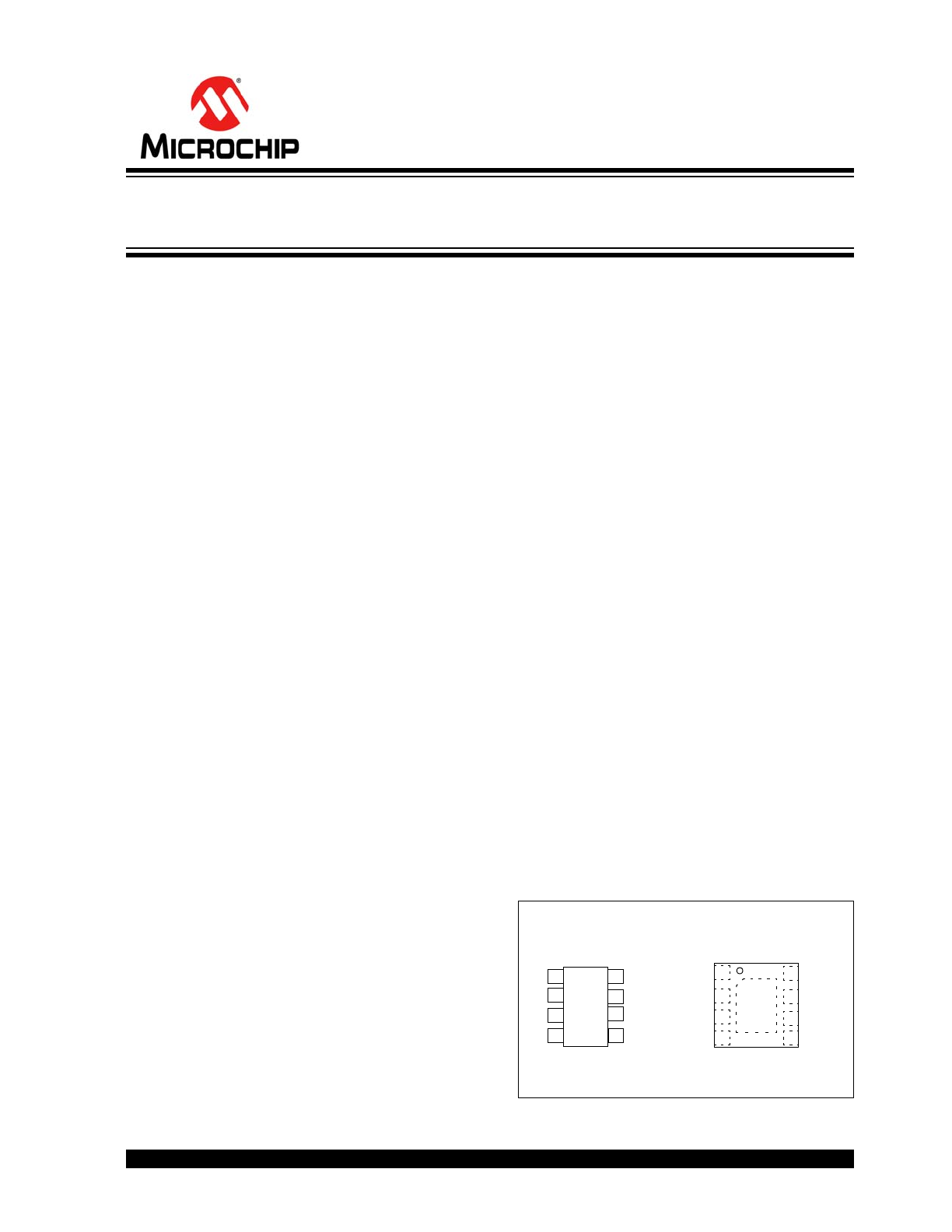
2013-2014 Microchip Technology Inc.
DS20005255B-page 1
MCP16311/2
Features
• Up to 95% Efficiency
• Input Voltage Range: 4.4V to 30V
• 1A Output Current Capability
• Output Voltage Range: 2.0V to 24V
• Qualification: AEC-Q100 Rev. G, Grade 1 (-40°C
to 125°C)
• Integrated N-Channel High-Side and Low-Side
Switches:
- 170 m
, Low Side
- 300 m
, High Side
• Stable Reference Voltage: 0.8V
• Automatic Pulse Frequency Modulation/Pulse-
Width Modulation (PFM/PWM) Operation
(MCP16311):
- PFM Operation Disabled (MCP16312)
- PWM Operation: 500 kHz
• Low Device Shutdown Current: 3 µA typical
• Low Device Quiescent Current:
- 44 µA (non-switching, PFM Mode)
• Internal Compensation
• Internal Soft-Start: 300 µs (EN low-to-high)
• Peak Current Mode Control
• Cycle-by-Cycle Peak Current Limit
• Undervoltage Lockout (UVLO):
- 4.1V typical to start
- 3.6V typical to stop
• Overtemperature Protection
• Thermal Shutdown:
- +150°C
- +25°C Hysteresis
Applications
• PIC
®
/dsPIC
®
Microcontroller Bias Supply
• 24V Industrial Input DC-DC Conversion
• General Purpose DC-DC Conversion
• Local Point of Load Regulation
• Automotive Battery Regulation
• Set-Top Boxes
• Cable Modems
• Wall Transformer Regulation
• Laptop Computers
• Networking Systems
• AC-DC Digital Control Bias
• Distributed Power Supplies
General Description
The MCP16311/2 is a compact, high-efficiency, fixed
frequency, synchronous step-down DC-DC converter in
an 8-pin MSOP, or 2 x 3 TDFN package that operates
from input voltage sources up to 30V. Integrated
features include a high-side and a low-side switch, fixed
frequency peak current mode control, internal
compensation, peak current limit and overtemperature
protection. The MCP16311/2 provides all the active
functions for local DC-DC conversion, with fast transient
response and accurate regulation.
High converter efficiency is achieved by integrating the
current-limited, low-resistance, high-speed high-side
and low-side switches and associated drive circuitry.
The MCP16311 is capable of running in PWM/PFM
mode. It switches in PFM mode for light load
conditions and for large buck conversion ratios. This
results in a higher efficiency over all load ranges. The
MCP16312 runs in PWM-only mode, and is
recommended for noise-sensitive applications.
The MCP16311/2 can supply up to 1A
of continuous
current while regulating the output voltage from 2V to
12V. An integrated, high-performance peak current
mode architecture keeps the output voltage tightly
regulated, even during input voltage steps and output
current transient conditions common in power systems.
The EN input is used to turn the device on and off.
While off, only a few micro amps of current are
consumed from the input.
Output voltage is set with an external resistor divider.
The MCP16311/2 is offered in small MSOP-8 and 2 x 3
TDFN surface mount packages.
Package Type
EN
V
CC
V
IN
BOOST
SW
1
2
3
4
8
7
6
5 P
GND
V
FB
EP
9
A
GND
5
1
2
3
A
GND
SW
EN
V
IN
V
FB
MCP16311/2
MSOP
8
7
6
BOOST
4
P
GND
V
CC
MCP16311/2
2x3 TDFN*
* Includes Exposed Thermal Pad (EP); see
Table 3-1
.
30V Input, 1A Output, High-Efficiency,
Integrated Synchronous Switch Step-Down Regulator
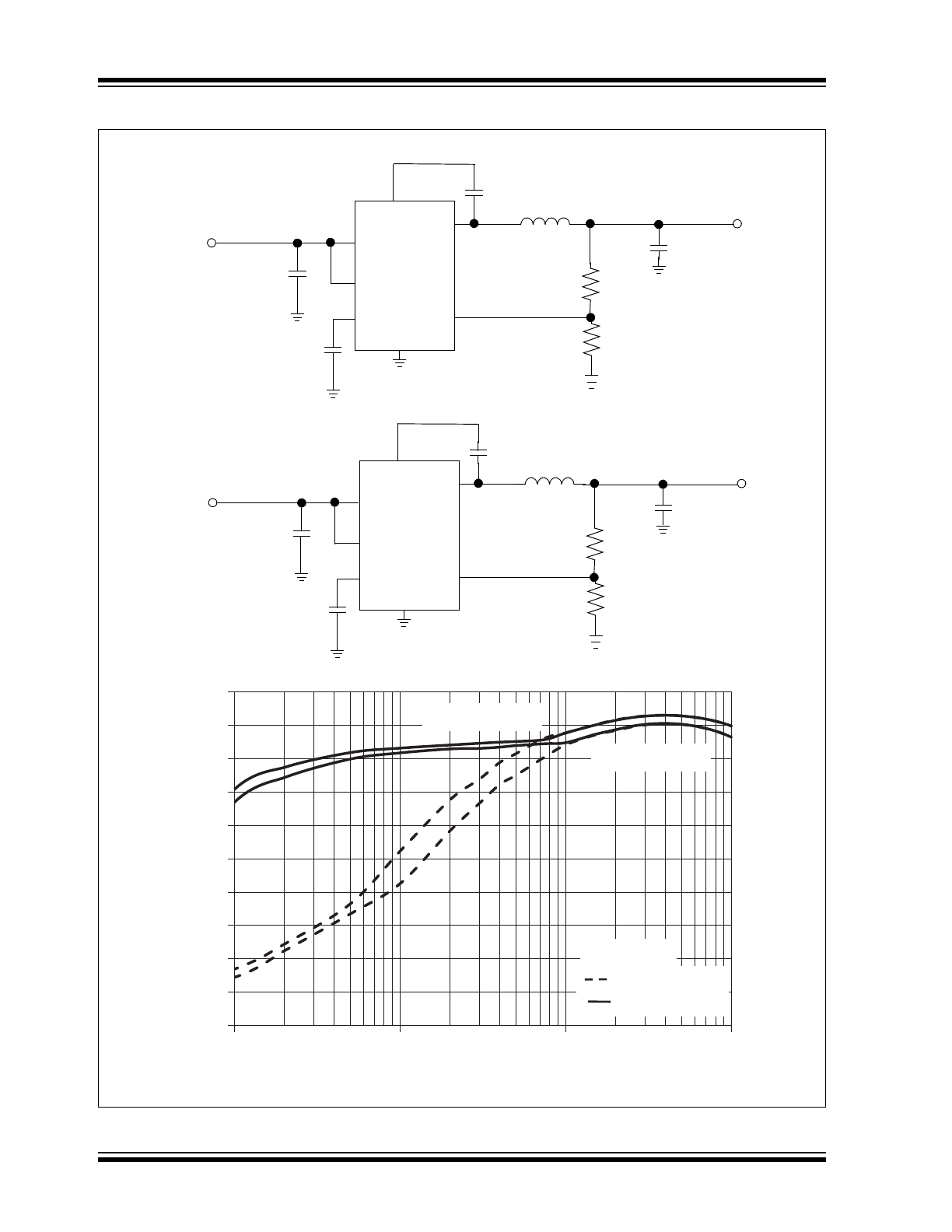
MCP16311/2
DS20005255B-page 2
2013-2014 Microchip Technology Inc.
Typical Applications
0
10
20
30
40
50
60
70
80
90
100
1 10
100
1000
Efficiency
(%
)
I
OUT
(mA)
PWM ONLY
PWM/PFM
V
IN
= 12V
OUT
= 5V
V
OUT
= 3.3V
V
V
IN
GND
V
FB
SW
V
IN
4.5V to 30V
V
OUT
3.3V @ 1A
C
OUT
2 x 10 µF
C
IN
2 x 10 µF
L
1
15 µH
BOOST
31.6 k
10 k
EN
C
BOOST
100 nF
V
CC
C
VCC
1 µF
V
IN
GND
V
FB
SW
V
in
6V to 30V
V
OUT
5V, @ 1A
C
OUT
2 x 10 µF
C
IN
2 x 10 µF
L
1
22 µH
BOOST
52.3 k
10 k
EN
C
BOOST
100 nF
V
CC
C
VCC
1 µF
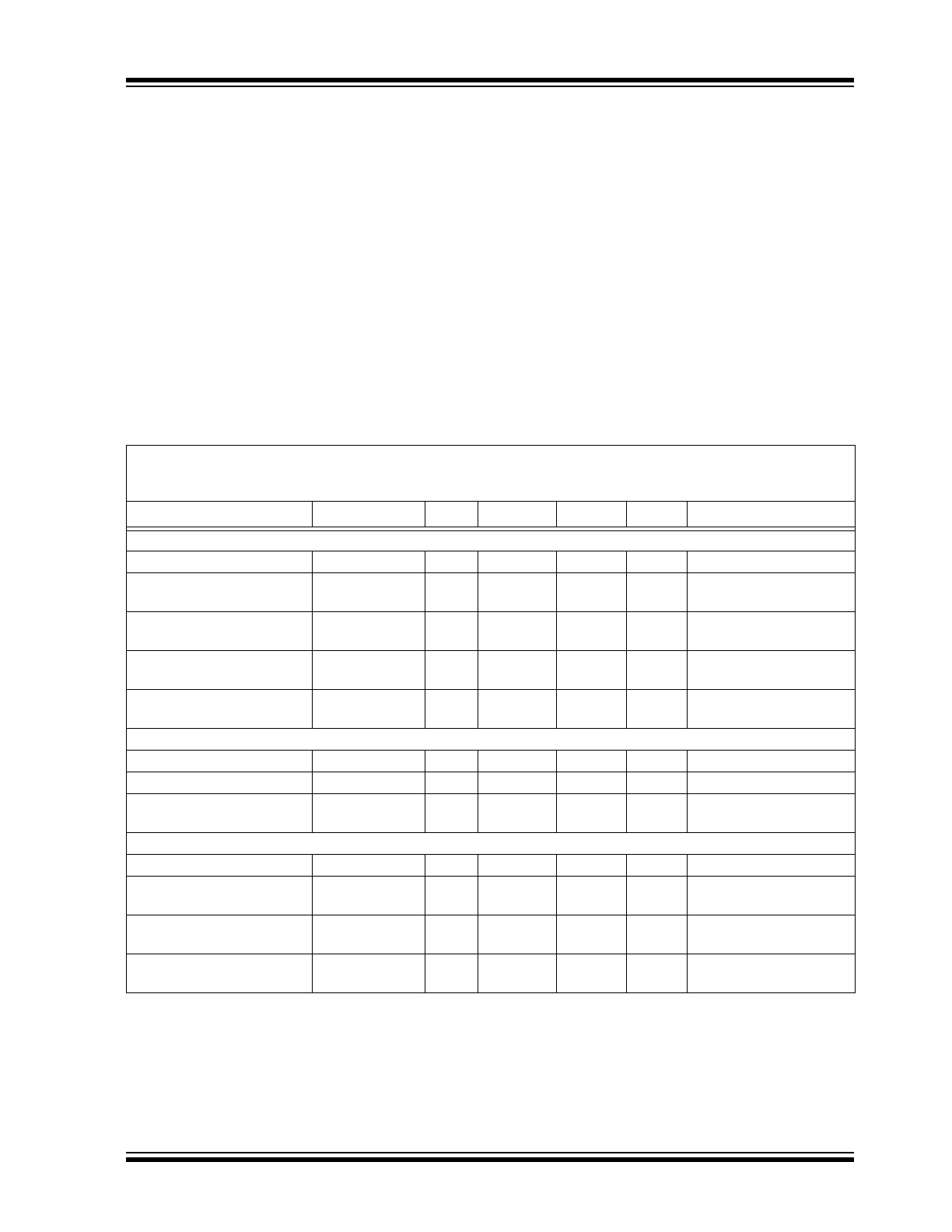
2013-2014 Microchip Technology Inc.
DS20005255B-page 3
MCP16311/2
1.0
ELECTRICAL
CHARACTERISTICS
Absolute Maximum Ratings †
V
IN,
SW ............................................................... -0.5V to 32V
BOOST – GND ................................................... -0.5V to 38V
BOOST – SW Voltage........................................ -0.5V to 6.0V
V
FB
Voltage ........................................................ -0.5V to 6.0V
EN Voltage ............................................. -0.5V to (V
IN
+ 0.3V)
Output Short-Circuit Current ................................. Continuous
Power Dissipation ....................................... Internally Limited
Storage Temperature ....................................-65°C to +150°C
Ambient Temperature with Power Applied ....-40°C to +125°C
Operating Junction Temperature...................-40°C to +150°C
ESD Protection on All Pins:
HBM ..................................................................... 1 kV
MM ......................................................................200V
† Notice:
Stresses above those listed under “Maximum
Ratings” may cause permanent damage to the device.
This is a stress rating only and functional operation of
the device at those or any other conditions above those
indicated in the operational sections of this
specification is not intended. Exposure to maximum
rating conditions for extended periods may affect
device reliability.
DC CHARACTERISTICS
Electrical Characteristics:
Unless otherwise indicated, T
A
= +25°C, V
IN
= V
EN
= 7V, V
BOOST
- V
SW
= 5.0V,
V
OUT
= 5.0V, I
OUT
= 100 mA, L = 22 µH, C
OUT
= C
IN
= 2 x 10 µF X7R Ceramic Capacitors.
Boldface
specifications apply over the T
A
range of -40°C to +125°C.
Parameters
Sym.
Min.
Typ.
Max.
Units
Conditions
V
IN
Supply Voltage
Input Voltage
V
IN
4.4
—
30
V
Note 1
Quiescent Current
I
Q
—
44
60
µA
Nonswitching,
V
FB
= 0.9V
Quiescent Current -
PFM Mode
I
Q_PFM
—
85
—
µA
Switching,
I
OUT
= 0 (MCP16311)
Quiescent Current -
PWM Mode
I
Q_PWM
—
3.8
8
mA
Switching,
I
OUT
= 0 (MCP16312)
Quiescent Current -
Shutdown
I
Q_SHDN
—
3
9
µA
V
OUT
= EN = 0V
V
IN
Undervoltage Lockout
Undervoltage Lockout Start
UVLO
STRT
—
4.1
4.4
V
V
IN
Rising
Undervoltage Lockout Stop
UVLO
STOP
3.18
3.6
—
V
V
IN
Falling
Undervoltage Lockout
Hysteresis
UVLO
HYS
0.2
0.5
1
V
Output Characteristics
Feedback Voltage
V
FB
0.784
0.800
0.816
V
I
OUT
= 5 mA
Output Voltage
Adjust Range
V
OUT
2.0
—
24
V
Note 2
,
Note 3
Feedback Voltage
Line Regulation
V
FB
/V
FB
)/
V
IN
-0.15
0.01
0.15
%/V
V
IN
= 7V to 30V,
I
OUT
= 50 mA
Feedback Voltage
Load Regulation
V
FB
/ V
FB
—
0.25
—
%
I
OUT
= 5 mA to 1A,
MCP16312
Note 1:
The input voltage should be greater than the output voltage plus headroom voltage; higher load currents
increase the input voltage necessary for regulation. See characterization graphs for typical input-to-output
operating voltage range.
2:
For V
IN
< V
OUT
, V
OUT
will not remain in regulation; for output voltages above 12V, the maximum current
will be limited to under 1A.
3:
Determined by characterization, not production tested.
4:
This is ensured by design.
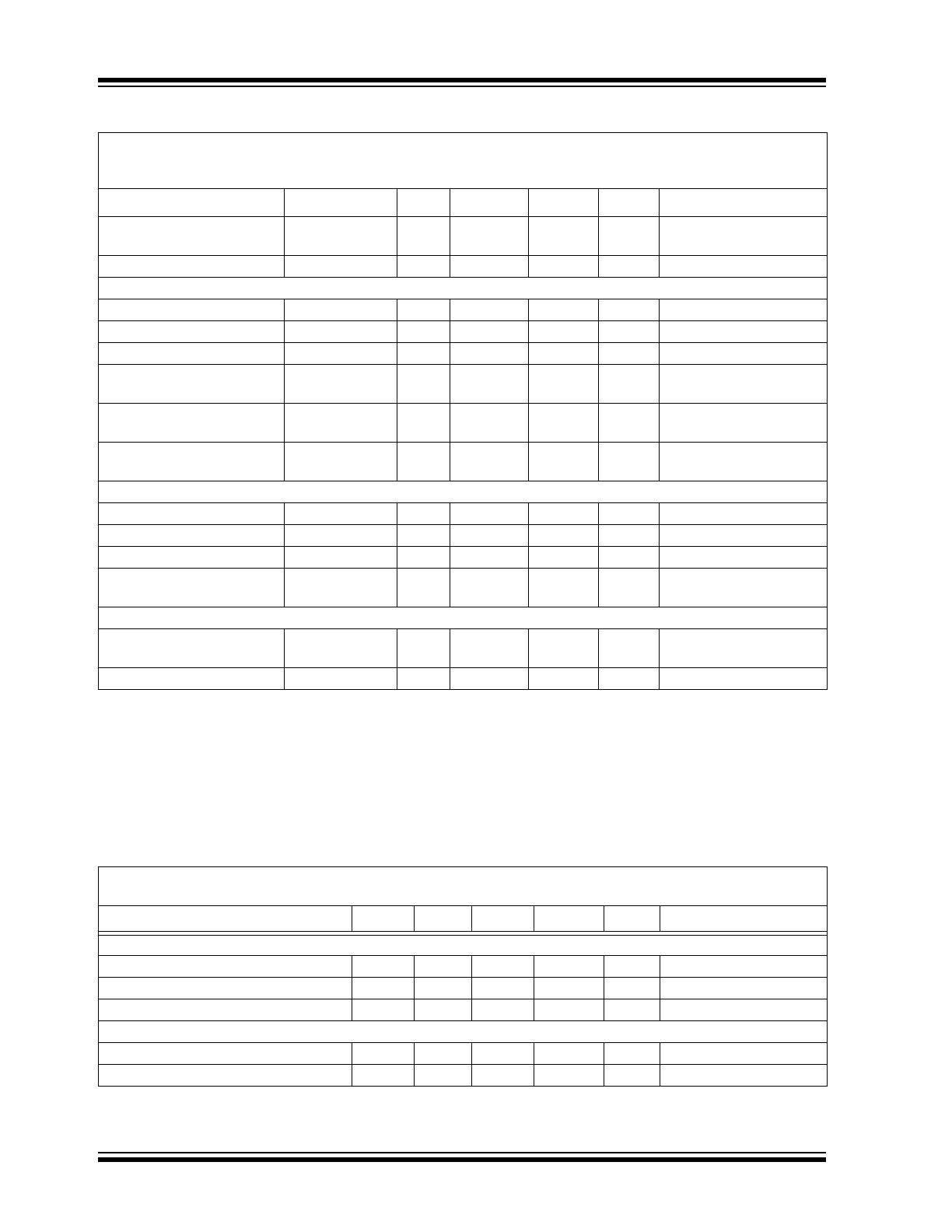
MCP16311/2
DS20005255B-page 4
2013-2014 Microchip Technology Inc.
Feedback Input
Bias Current
I
FB
—
10
250
nA
Output Current
I
OUT
1
—
—
A
Notes 1
to
3
,
Figure 2-7
Switching Characteristics
Switching Frequency
f
SW
425
500
575
kHz
Maximum Duty Cycle
DC
MAX
85
94
—
%
Note 3
Minimum Duty Cycle
DC
MIN
—
2
—
%
Note 4
High-Side NMOS Switch-On
Resistance
R
DS(ON)
—
0.3
—
V
BOOST
– V
SW
= 5V,
Note 3
Buck NMOS Switch
Current Limit
I
(MAX)
—
1.8
—
A
V
BOOST
– V
SW
= 5V,
Note 3
Synchronous NMOS Switch-
On Resistance
R
DS(ON)
—
0.17
—
Note 3
EN Input Characteristics
EN Input Logic High
V
IH
1.85
—
—
V
EN Input Logic Low
V
IL
—
—
0.4
V
EN Input Leakage Current
I
ENLK
—
0.1
1
µA
V
EN
= 5V
Soft-Start Time
t
SS
—
300
—
µs
EN Low-to-High,
90% of V
OUT
Thermal Characteristics
Thermal Shutdown
Die Temperature
T
SD
—
150
—
°C
Note 3
Die Temperature Hysteresis
T
SDHYS
—
25
—
°C
Note 3
TEMPERATURE CHARACTERISTICS
Electrical Specifications:
Unless otherwise indicated, T
A
= +25°C, V
IN
= V
EN
= 7V, V
BOOST
- V
SW
= 5.0V,
V
OUT
= 5.0V.
Parameters
Sym.
Min.
Typ.
Max.
Units
Conditions
Temperature Ranges
Operating Junction Temperature Range
T
J
-40
—
+125
°C
Steady State
Storage Temperature Range
T
A
-65
—
+150
°C
Maximum Junction Temperature
T
J
—
—
+150
°C
Transient
Package Thermal Resistances
Thermal Resistance, 8L-MSOP
JA
—
211
—
°C/W
EIA/JESD51-3 Standard
Thermal Resistance, 8L-2x3 TDFN
JA
—
52.5
—
°C/W
EIA/JESD51-3 Standard
DC CHARACTERISTICS (CONTINUED)
Electrical Characteristics:
Unless otherwise indicated, T
A
= +25°C, V
IN
= V
EN
= 7V, V
BOOST
- V
SW
= 5.0V,
V
OUT
= 5.0V, I
OUT
= 100 mA, L = 22 µH, C
OUT
= C
IN
= 2 x 10 µF X7R Ceramic Capacitors.
Boldface
specifications apply over the T
A
range of -40°C to +125°C.
Parameters
Sym.
Min.
Typ.
Max.
Units
Conditions
Note 1:
The input voltage should be greater than the output voltage plus headroom voltage; higher load currents
increase the input voltage necessary for regulation. See characterization graphs for typical input-to-output
operating voltage range.
2:
For V
IN
< V
OUT
, V
OUT
will not remain in regulation; for output voltages above 12V, the maximum current
will be limited to under 1A.
3:
Determined by characterization, not production tested.
4:
This is ensured by design.
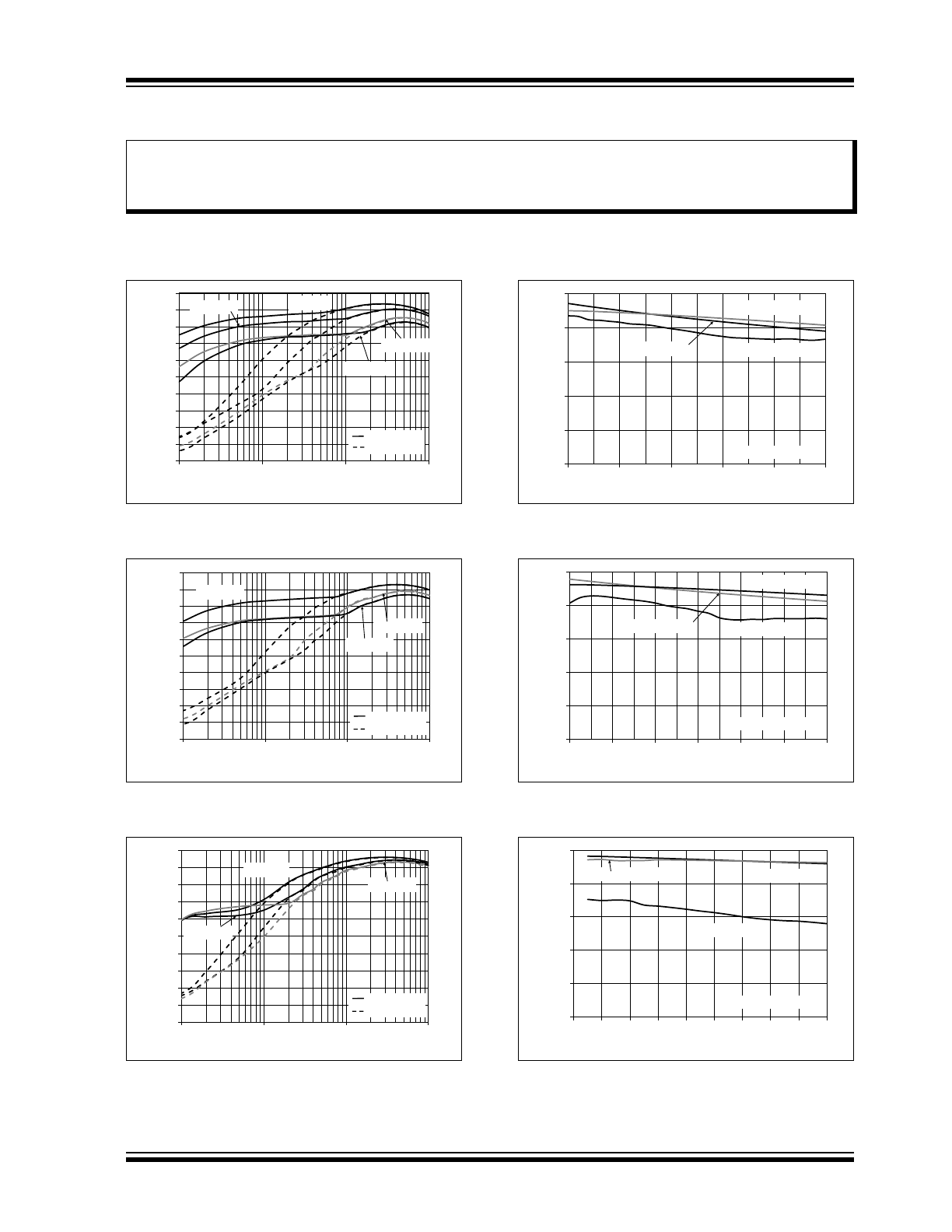
2013-2014 Microchip Technology Inc.
DS20005255B-page 5
MCP16311/2
2.0
TYPICAL PERFORMANCE CURVES
Note:
Unless otherwise indicated, V
IN
= EN = 7V, C
OUT
= C
IN
= 2 x 10 µF, L
= 22 µH, V
OUT
= 5.0V, I
LOAD
= 100 mA,
T
A
= +25°C
,
8L-MSOP package.
FIGURE 2-1:
3.3V V
OUT
Efficiency vs.
I
OUT
.
FIGURE 2-2:
5.0V V
OUT
Efficiency vs.
I
OUT
.
FIGURE 2-3:
12.0V V
OUT
Efficiency vs.
I
OUT
.
FIGURE 2-4:
3.3V V
OUT
Efficiency vs.V
IN
.
FIGURE 2-5:
5.0V V
OUT
Efficiency vs.V
IN
.
FIGURE 2-6:
12.0V V
OUT
Efficiency vs.
V
IN
.
Note:
The graphs and tables provided following this note are a statistical summary based on a limited number of
samples and are provided for informational purposes only. The performance characteristics listed herein
are not tested or guaranteed. In some graphs or tables, the data presented may be outside the specified
operating range (e.g., outside specified power supply range) and therefore outside the warranted range.
0
10
20
30
40
50
60
70
80
90
100
1
10
100
1000
Efficiency
(%
)
I
OUT
(mA)
V
IN
= 6V
V
IN
= 12V
V
IN
= 24V
V
IN
= 30V
PWM/PFM
PWM ONLY
0
10
20
30
40
50
60
70
80
90
100
1
10
100
1000
Efficiency
(%
)
I
OUT
(mA)
V
IN
= 12V
V
IN
= 24V
V
IN
= 30V
PWM/PFM
PWM ONLY
0
10
20
30
40
50
60
70
80
90
100
1
10
100
1000
Efficiency
(%
)
I
OUT
(mA)
V
IN
= 15V
V
IN
= 24V
V
IN
= 30V
PWM/PFM
PWM ONLY
0
20
40
60
80
100
5
10
15
20
25
30
Efficiency
(%
)
V
IN
(V)
I
OUT
= 10 mA
I
OUT
= 200 mA
I
OUT
= 800 mA
PWM/PFM option
0
20
40
60
80
100
6
10
14
18
22
26
30
Efficiency
(%
)
V
IN
(V)
I
OUT
= 10 mA
I
OUT
= 200 mA
I
OUT
= 800 mA
PWM/PFM option
0
20
40
60
80
100
12
14
16
18
20
22
24
26
28
30
Efficiency
(%
)
V
IN
(V)
I
OUT
= 10 mA
I
OUT
= 200 mA
I
OUT
= 800 mA
PWM/PFM option
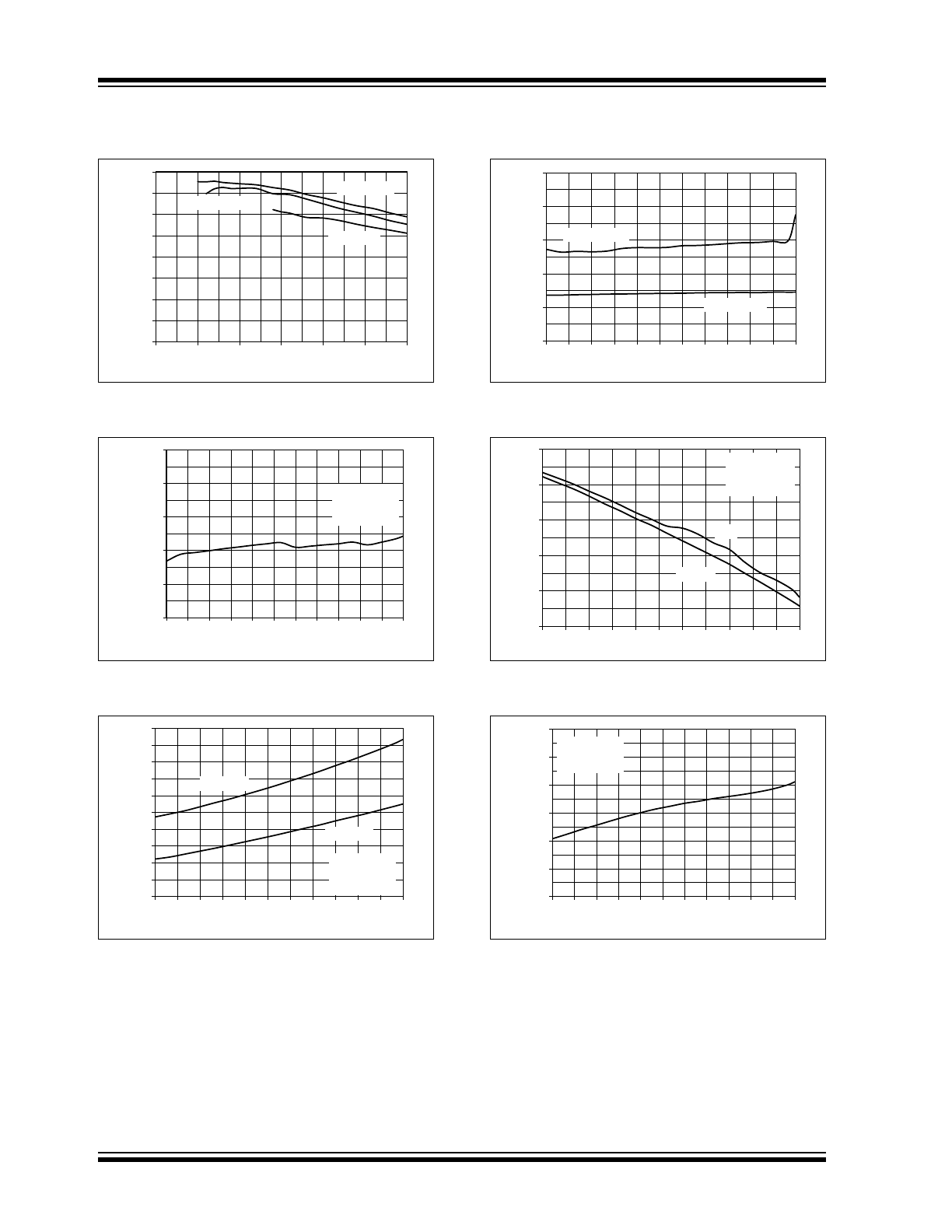
MCP16311/2
DS20005255B-page 6
2013-2014 Microchip Technology Inc.
Note:
Unless otherwise indicated, V
IN
= EN = 7V, C
OUT
= C
IN
= 2 x 10 µF, L
= 22 µH, V
OUT
= 5.0V, I
LOAD
= 100 mA,
T
A
= +25°C
,
8L-MSOP package
.
FIGURE 2-7:
Max I
OUT
vs.V
IN.
FIGURE 2-8:
V
FB
vs. Temperature;
V
OUT
= 3.3V.
FIGURE 2-9:
Switch R
DSON
vs.
Temperature.
FIGURE 2-10:
Undervoltage Lockout vs.
Temperature.
FIGURE 2-11:
Enable Threshold Voltage
vs. Temperature.
FIGURE 2-12:
V
OUT
vs. Temperature.
0
200
400
600
800
1000
1200
1400
1600
0
5
10
15
20
25
30
I
OUT
(mA)
V
IN
(V)
V
OUT
= 3.3V
V
OUT
= 5V
V
OUT
= 12V
0.79
0.792
0.794
0.796
0.798
0.8
-40 -25 -10
5
20 35 50 65 80 95 110 125
Feedback V
o
ltage (V)
Temperature (°C)
V
IN
=7V
V
OUT
= 3.3V
I
OUT
= 100 mA
0
0.05
0.1
0.15
0.2
0.25
0.3
0.35
0.4
0.45
0.5
-40 -25 -10
5
20
35
50
65
80
95 110 125
Sw
itch R
DSON
(:
)
Temperature (°C)
Low Side
High Side
V
IN
= 12V
V
OUT
= 5V
I
OUT
= 500 mA
3
3.4
3.8
4.2
4.6
5
-40 -25 -10
5
20
35
50
65
80
95 110 125
Input V
o
ltage
(V)
Temperature (°C)
UVLO START
UVLO STOP
0.9
1
1.1
1.2
1.3
1.4
-40 -25 -10
5
20
35
50
65
80
95 110 125
Enable V
o
ltage
(V)
Temperature (°C)
HIGH
LOW
V
IN
= 12V
V
OUT
= 3.3V
I
OUT
= 200 mA
4.97
4.98
4.99
5
5.01
5.02
5.03
-40 -25 -10
5
20
35
50
65
80
95 110 125
Output V
o
ltage
(V)
Temperature (°C)
V
IN
= 12V
V
OUT
= 5V
I
OUT
= 100 mA
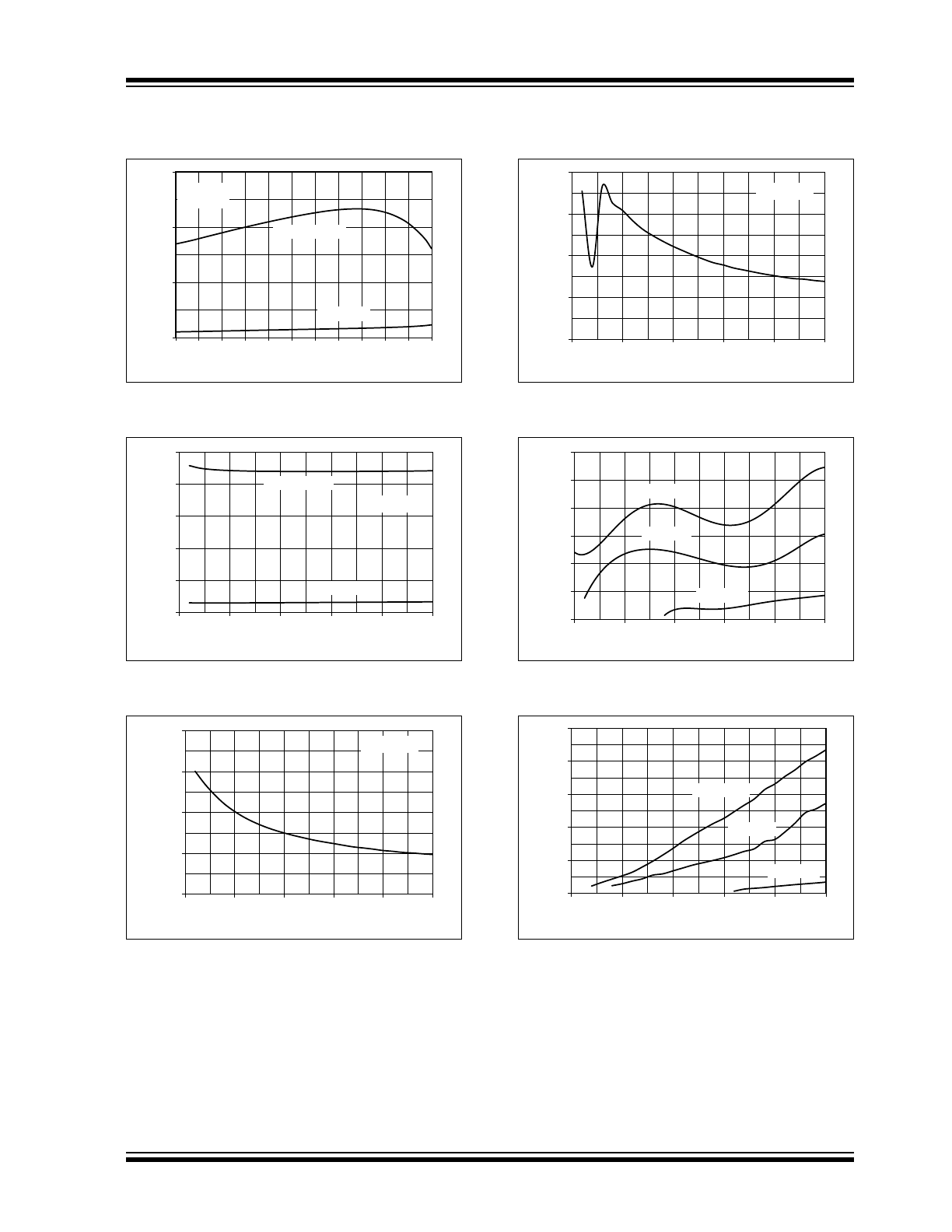
2013-2014 Microchip Technology Inc.
DS20005255B-page 7
MCP16311/2
Note:
Unless otherwise indicated, V
IN
= EN = 7V, C
OUT
= C
IN
= 2 x 10 µF, L
= 22 µH, V
OUT
= 5.0V, I
LOAD
= 100 mA,
T
A
= +25°C
,
8L-MSOP package
.
FIGURE 2-13:
Input Quiescent Current vs.
Temperature.
FIGURE 2-14:
Input Quiescent Current vs.
Input Voltage.
FIGURE 2-15:
PFM No Load Input Current
vs. Input Voltage, MCP16311.
FIGURE 2-16:
PWM No Load Input Current
vs.V
IN
, MCP16312.
FIGURE 2-17:
PFM/PWM I
OUT
Threshold
vs. V
IN
.
FIGURE 2-18:
Skipping/PWM I
OUT
Threshold vs. Input Voltage.
0
20
40
60
-40 -25 -10
5
20
35
50
65
80
95 110 125
Quiescent Current (μA)
Temperature (°C)
Non-Swithcing
Shutdown
V
IN
= 12V
V
OUT
= 5V
0
10
20
30
40
50
5
10
15
20
25
30
Quiescent Current (μA)
Input Voltage (°C)
Non-Switching
Shutdown
V
OUT
= 3.3V
40
60
80
100
120
5
10
15
20
25
30
No Load Input Current (μA)
Input Voltage (V)
V
OUT
= 3.3V
1
1.2
1.4
1.6
1.8
5
10
15
20
25
30
Input Current
(mA)
V
IN
(V)
V
OUT
= 3.3V
0
25
50
75
100
125
150
5
10
15
20
25
30
Output Current
(mA)
V
IN
(V)
V
OUT
= 3.3V
V
OUT
= 5V
V
OUT
= 12V
0
10
20
30
40
50
5
10
15
20
25
30
Output Current
(mA)
V
IN
(V)
V
OUT
= 5V
V
OUT
= 3.3V
V
OUT
= 12V
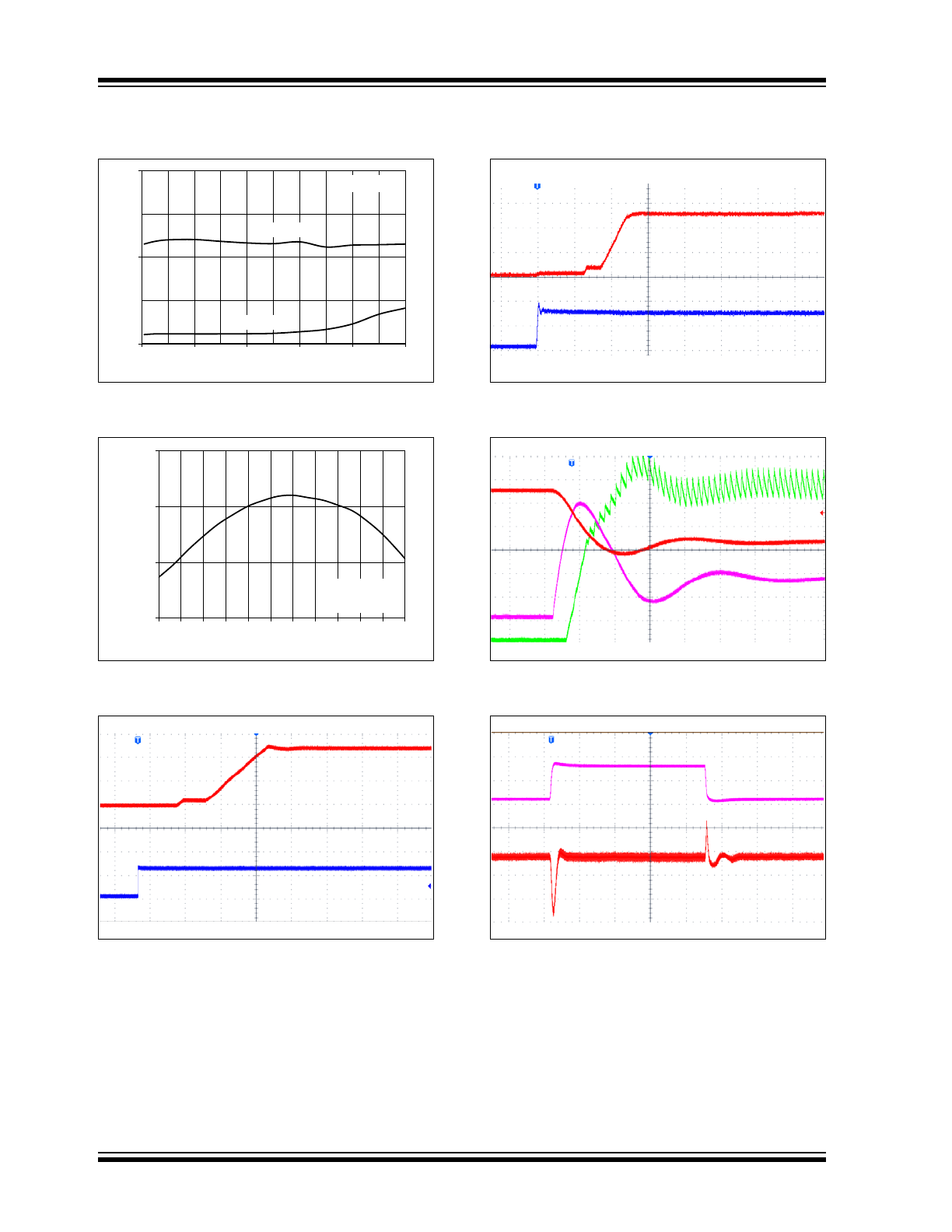
MCP16311/2
DS20005255B-page 8
2013-2014 Microchip Technology Inc.
Note:
Unless otherwise indicated, V
IN
= EN = 7V, C
OUT
= C
IN
= 2 x 10 µF, L
= 22 µH, V
OUT
= 5.0V, I
LOAD
= 100 mA,
T
A
= +25°C
,
8L-MSOP package
.
FIGURE 2-19:
Typical Minimum Input
Voltage vs. Output Current.
FIGURE 2-20:
Switching Frequency vs.
Temperature.
FIGURE 2-21:
Start-Up From Enable.
FIGURE 2-22:
Start-Up From V
IN
.
FIGURE 2-23:
Short-Circuit Response.
FIGURE 2-24:
Load Transient Response.
3.5
4
4.5
0
200
400
600
800
1000
V
IN
(V)
Output Current (mA)
To Start
To Stop
V
OUT
= 3.3V
450
475
500
525
-40 -25 -10
5
20
35
50
65
80
95 110 125
Sw
itching Frequency
(kHz)
Temperature (°C)
V
IN
= 12V
V
OUT
= 3.3V
I
OUT
= 200 mA
V
OUT
2 V/div
EN
2 V/div
80 µs/div
V
OUT
2 V/div
V
IN
5 V/div
200 µs/div
V
OUT
2 V/div
I
OUT
2 A/div
10 µs/div
I
L
500 mA/div
V
OUT
100 mV/div
I
OUT
500 mA/div
200 µs/div
AC Coupled
Load Step from
100 mA to 800 mA
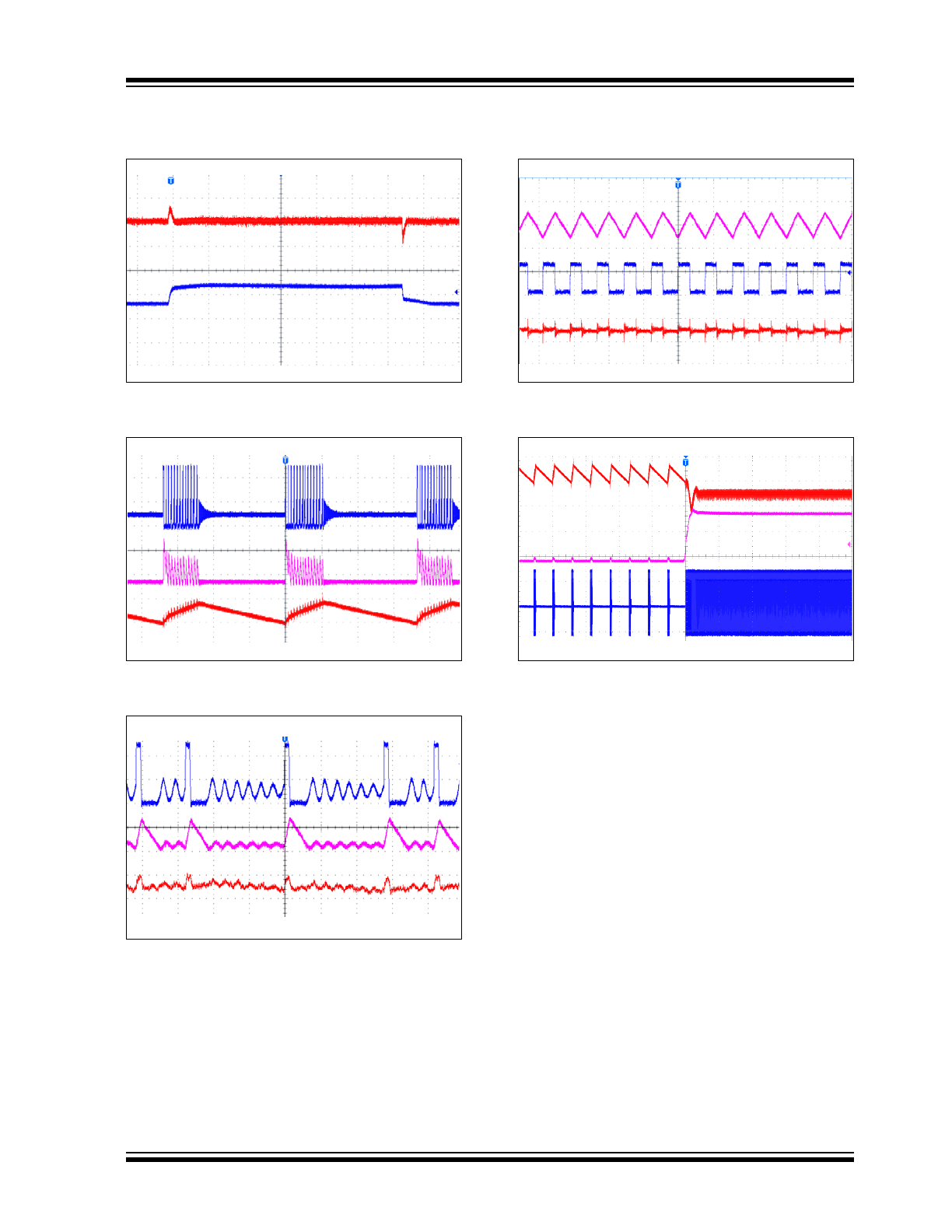
2013-2014 Microchip Technology Inc.
DS20005255B-page 9
MCP16311/2
Note:
Unless otherwise indicated, V
IN
= EN = 7V, C
OUT
= C
IN
= 2 x 10 µF, L
= 22 µH, V
OUT
= 5.0V, I
LOAD
= 100 mA,
T
A
= +25°C
,
8L-MSOP package
.
FIGURE 2-25:
Line Transient Response.
FIGURE 2-26:
PFM Light Load Switching
Waveforms.
FIGURE 2-27:
PWM Light Load Switching
Waveforms.
FIGURE 2-28:
Heavy Load Switching
Waveforms.
FIGURE 2-29:
PFM to PWM Transition;
Load Step from 5 mA to 100 mA.
V
OUT
50 mV/div
V
IN
5 V/div
400 µs/div
AC Coupled
V
IN
Step from 7V to 12V
V
OUT
100 mV/div
I
L
200 mA/div
20 µs/div
V
IN
= 24V
SW
10 V/div
I
OUT
= 25 mA
AC Coupled
V
OUT
10 mV/div
I
L
100 mA/div
1 µs/div
V
IN
= 24V
SW
10 V/div
I
OUT
= 15 mA
AC Coupled
V
OUT
50 mV/div
I
L
200 mA/div
2 µs/div
V
IN
= 12V
SW
10 V/div
V
OUT
= 5V
I
OUT
= 800 mA
AC Coupled
V
OUT
100 mV/div
Load Current
50 mA/div
400 µs/div
V
IN
= 12V
SW
5 V/div
V
OUT
= 5V
AC Coupled

MCP16311/2
DS20005255B-page 10
2013-2014 Microchip Technology Inc.
NOTES:
